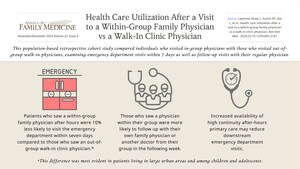PROVIDENCE, R.I., July 23, 2024 /PRNewswire/ -- New research published in the latest issue of Annals of Family Medicine provides greater insights into racial disparities in newborn drug testing practices that disproportionately impact Black birthing parents and their newborns. The study, conducted by researchers at the University of Michigan, provides a critical examination of how structural racism influences these inequities and calls for urgent policy changes to address the issue.
The qualitative study, titled "Structural Racism in Newborn Drug Testing: Perspectives of Health Care and Child Protective Services Professionals" explores the knowledge, attitudes, and experiences of health care and Child Protective Services (CPS) professionals regarding newborn drug testing practices.
Key findings include:
- Levels of racism beyond the hospital contributed to higher rates of drug testing of Black newborns.
- Variations in hospital policies lead to racialized application of state laws and subsequent CPS reporting.
- Health care professionals' knowledge of the benefits and harms of CPS reporting on Black families influenced their testing decision making.
Health care professionals recognized structural racism as a driver of disproportionate newborn drug testing. However, their beliefs, lack of knowledge, and skill limitations were barriers to dismantling power structures impeding systems-level change. Reflecting on the results of their study, the authors urge the need for institutional and policy changes to shift the focus from biologic testing to a more holistic approach that supports both the birthing parent and the child. Recommendations include implementing family-centered substance use treatment and enacting state and federal policy reforms to prevent unnecessary CPS reporting when there is no evidence of child abuse or neglect. Putting their recommendations into practice, study authors Dr. Shetty and Dr. Oshman are currently advocating for state policy change as part of a coalition named safe mi. Safe mi is a coalition of academic, legal, health care experts and researchers advocating for substance use treatment for pregnant people that centers families, eliminates health disparities, and connects parents to systems of support. Safe mi aims to reform reporting laws to shift focus to treatment.
An accompanying editorial, "Stop Testing Black Babies!," featuring perspectives from physicians with expertise in racism, trained in OB/GYN, urogynecology, medicine/pediatrics, allergy/immunology and family medicine, underscores the importance of addressing structural racism in newborn drug testing. The editorialists argue that ingrained stereotypes and inconsistent hospital policies lead to biased testing and harmful referrals to CPS. They advocate for the adoption of maternal questionnaires over newborn drug testing and the establishment of clear, consistent policies to ensure equitable treatment.
The editorial also highlights the Substance Abuse Disorder and Family Engagement (SAFE) in Recovery Act as a legislative effort to support families and reduce unnecessary separations. The editorialists call on health professionals and policymakers to recognize and address the biases in newborn drug testing practices to restore trust between Black families and health systems.
To hear more from the researchers about this important study, tune in to the latest episode of the Annals of Family Medicine Podcast where lead authors Dr. Carol Shetty and Dr. Lauren Oshman discuss this study in detail. Listen to the podcast episode here.
Additional Resources:
- State reporting requirements from If/When/How: Prenatal Drug Exposure and CAPTA
- Doing Right at Birth modules for health care professionals: Doing Right at Birth
- safe mi coalition: https://safemi.org/
Articles Cited:
Structural Racism in Newborn Drug Testing: Perspectives of Health Care and Child Protective Services Professionals
Carol Shetty, MD, Lauren Oshman, MD, MPH, Amanda Costa, MD, Victoria Waidley, MD, Emily Madlambayan, BS, Madgean Joassaint, BA, Katharine McCabe, PhD, Courtney Townsel, MD, MSc, Justine P. Wu, MD, MPH, Christopher J. Frank, MD, PhD, and P. Paul Chandanabhumma, PhD, MPH
Stop Testing Black Babies!
Cleavon Covington, MD, MS, FAAP, Elisha Jackson, MD, Kendall M. Campbell, MD, FAAFP, Judy C. Washington, MD, and José E. Rodríguez, MD
Annals of Family Medicine is a peer-reviewed, indexed research journal that provides a cross-disciplinary forum for new, evidence-based information affecting the primary care disciplines. Launched in May 2003, Annals of Family Medicine is sponsored by seven family medical organizations, including the American Academy of Family Physicians, the American Board of Family Medicine, the Society of Teachers of Family Medicine, the Association of Departments of Family Medicine, the Association of Family Medicine Residency Directors, the North American Primary Care Research Group, and the College of Family Physicians of Canada. Annals of Family Medicine is published online six times each year and contains original research from the clinical, biomedical, social, and health services areas, as well as contributions on methodology and theory, selected reviews, essays, and editorials. Complete editorial content and interactive discussion groups for each published article can be accessed for free on the journal's website, www.AnnFamMed.org.
SOURCE Annals of Family Medicine

WANT YOUR COMPANY'S NEWS FEATURED ON PRNEWSWIRE.COM?
Newsrooms &
Influencers
Digital Media
Outlets
Journalists
Opted In





Share this article